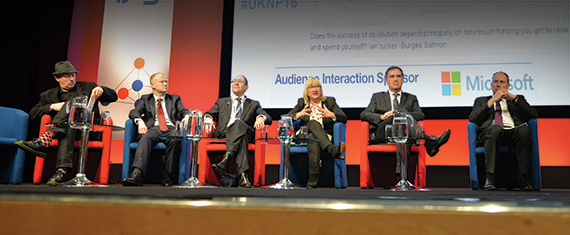 There is a drink served on the 23rd floor of the Manchester Hilton called the Industrialist. A miniature bottle of syrup-lined whisky is poured over a fistful of candy floss which is dissolved by the potent alcohol. The drink honours the city’s industrial history and is served in a skyscraper which alludes to its more recent prosperity.
There is a drink served on the 23rd floor of the Manchester Hilton called the Industrialist. A miniature bottle of syrup-lined whisky is poured over a fistful of candy floss which is dissolved by the potent alcohol. The drink honours the city’s industrial history and is served in a skyscraper which alludes to its more recent prosperity.
It was an appropriate tipple for delegates during a pause in the two-day Northern Powerhouse Conference.
“The northern powerhouse is not new,” Sheffield City Council’s chief executive John Mothersole reminded delegates. “The North used to be a powerhouse. And for 30, 40 years it hasn’t been. So we are edging back to where we came from…”
In 2013 the North of England accounted for 13.3% of UK growth, compared with London’s 24.5%, according to research by conference host Lambert Smith Hampton.
If Manchester’s property market has boomed since then, other regions across the North have yet to benefit from the same scale of inward investment. But the momentum behind the powerhouse concept was demonstrated by the 2,000 professionals who attended the conference last week.
Northern powerhouse brand
Defining what exactly the northern powerhouse is to foreign investors is still a problem, said AECOM executive vice-president Chi Chung Wong.
“We still need to do some more work, in terms of branding this out, identifying clearly what those opportunities are,” he said. “I’m not sure that it’s very clear yet to some of our clients.”
Former deputy prime minister John Prescott agreed the northern powerhouse needed a “regional dimension”, not just local government reform. IPPR’s Ed Cox said the region needed a “Great North Plan” similar to the London Plan.
Collaboration vs Competition
For the northern powerhouse to be a success, it will require collaboration between city regions.
Newcastle, Manchester, Sheffield, Liverpool and Leeds city council chief executives were all put on the spot about how they would react if Google wanted to locate its UK HQ in the North.
Sheffield’s Mothersole said that while in the past there might have been “secret competition” between the different cities trying to lure the company, now they would be open to making “collective proposals”.
Manchester City Council chief executive Sir Howard Bernstein said the cities had different strengths which would make different occupiers more attractive to them, and that we could see a more joined-up procurement process in the future.
A poll at the end of day one found that 69% of surveyed delegates were optimistic about the future success of the northern powerhouse agenda.
But departing delegates were met with flyering trade unionists calling for the Department for Business, Innovation and Skills to revoke its decision to move 100 jobs from Sheffield and other regions to London.
So is there genuine political will behind the concept?
Delivering the keynote speech, commercial secretary to the Treasury Lord O’Neill of Gately said: “It is very important for other departments as well as everyone around the country to realise that this is something which is a major priority of the government.” But he said it was ultimately up to business leaders to ensure its success.
Arguably the loudest applause at the conference was for Urban Splash chairman Tom Bloxham.
Asked what he would change if he had a magic wand, he said central government should spend six months in each of the northern cities when it moves out of the Palaces of Westminster during the buildings’ refurbishment. “It will cost them less than any other alternative, they can use the facilities here and see what a great place it is in the North,” he said.
Listen to interviews from the conference at www.estatesgazette.libsyn.com
To send feedback, e-mail Louisa.Clarence-Smith@estatesgazette.com or tweet @LouisaClarence or @estatesgazette











